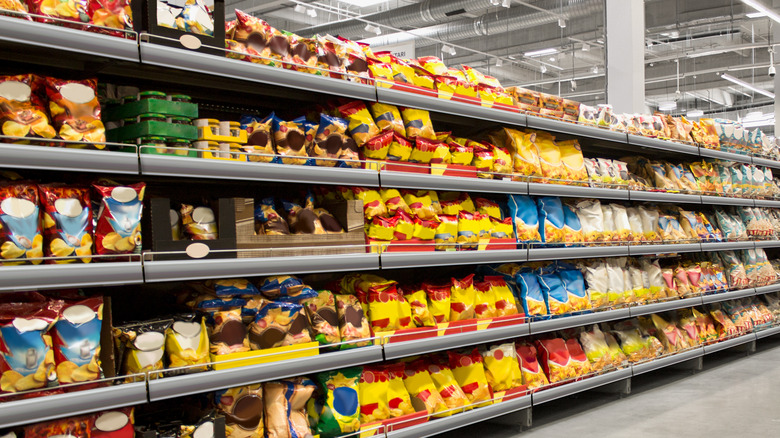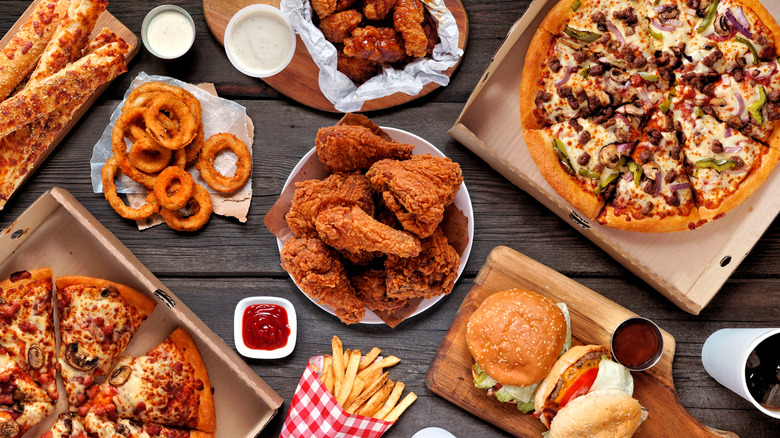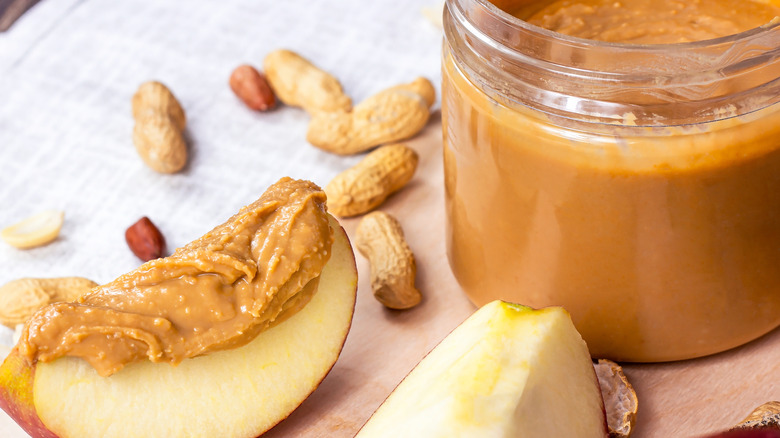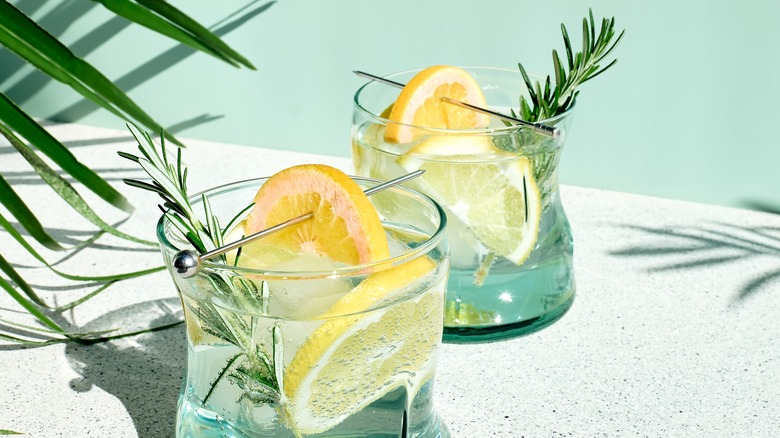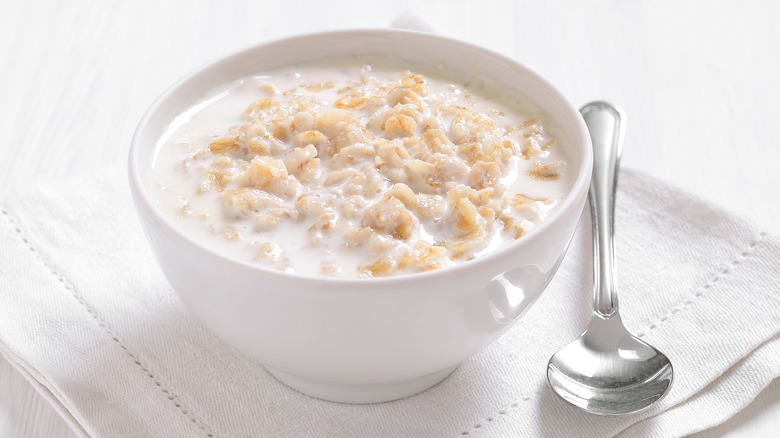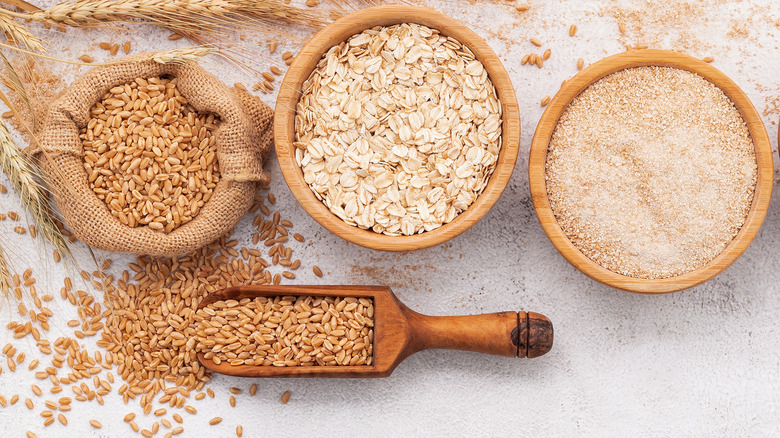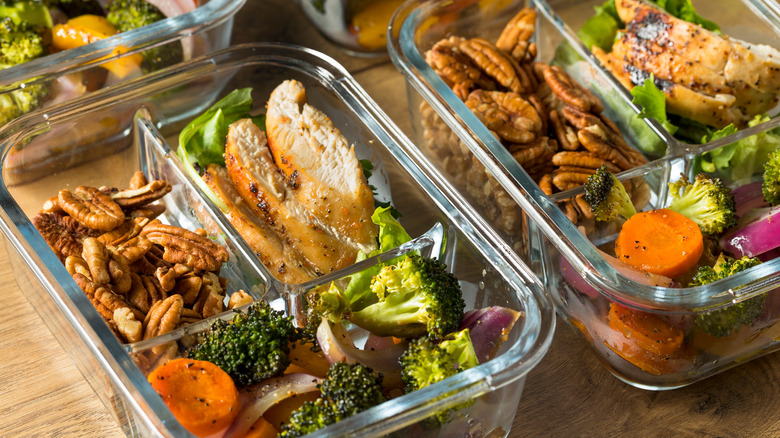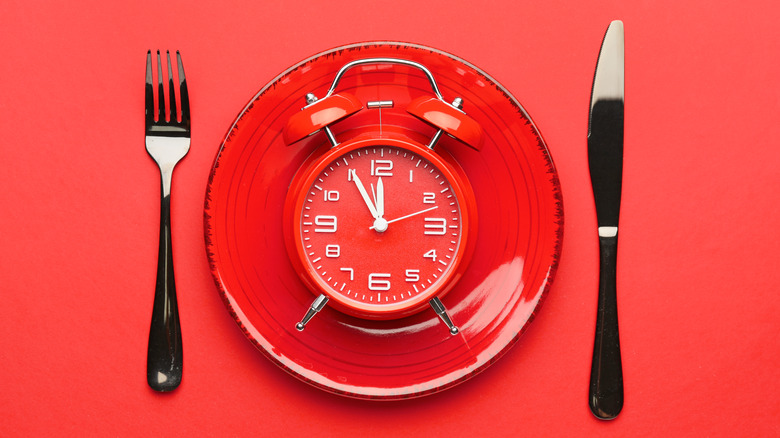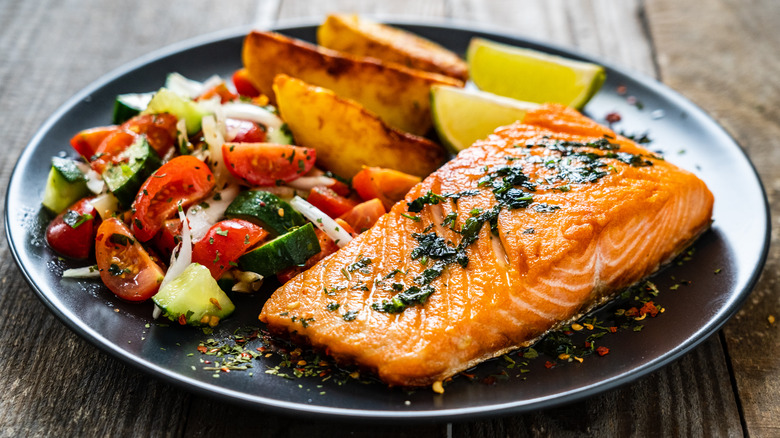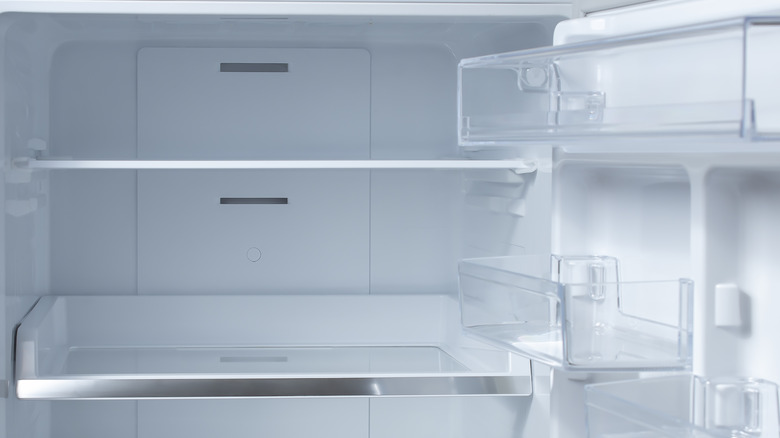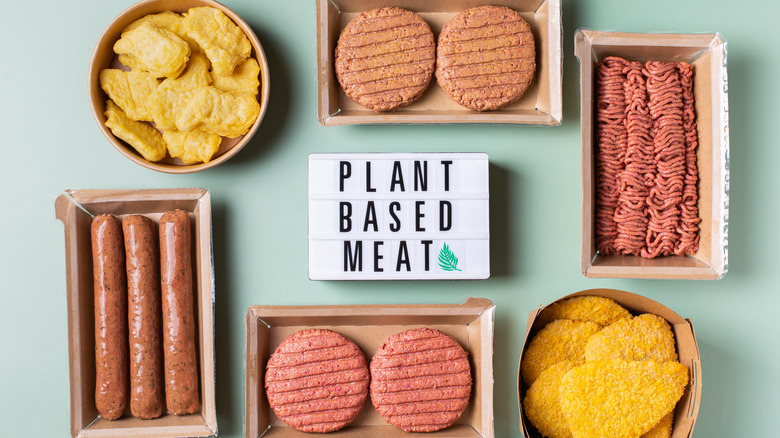Realistic Ways To Limit Processed Foods In Your Diet
Processed food is everywhere, and things have been this way for quite some time. But while food processing is hardly a new phenomenon, with some of the oldest dietary staples like milk to Greek yogurt undergoing processing to get to our tables (per the AARP), the processed food of the 21st century is a different beast. Nowadays, seemingly simple foods can have a mind-boggling amount of ingredients — and despite our increasing understanding of what eating large amounts of processed foods can do to our bodies, their popularity continues to rise.
Over the 2000s and 2010s, the amount of processed foods U.S. adults ate rose significantly, with almost 60% of all calories consumed coming from processed foods by 2018, according to a study published in The American Journal of Clinical Nutrition. "This is concerning, as eating more ultra-processed foods is associated with poor diet quality and higher risk of several chronic diseases," says the lead author of the study and NYU School of Public Health assistant professor Filippa Juul (via Science Daily).
Considering how embedded these foods are in our day-to-day diets, how do we go about eating less of them? Sure, eating nothing but whole foods is an option, but let's face it, folks: That's hard. Here are some ways to reduce processed foods in your diet that are easy to do and won't break the bank.
Why should you limit processed food in your diet?
It's important to point out, first and foremost, that not all food processing is bad (per Medical News Today). Food processing can include altering foods without adding anything to change their form, like grinding beef or combining whole ingredients to make a still-healthy new product (like hummus). But it's when things start getting added that there's a problem. In the case of ultra-processed foods like packaged bread, instant noodles, and frozen meals, manufacturers can pump them full of additional sodium, sugar, and unhealthy fats, as well as other artificial additives, colorings, and sweeteners — and that can quickly make the ingredients list incomprehensible.
While these foods may taste good, they're not good for you. The sugars added to ultra-processed foods, like corn syrup, can increase the risk of conditions like metabolic syndrome and type 2 diabetes, as well as produce inflammation. Saturated and trans fats in these products may also harm cholesterol levels and increase the risk of cardiovascular diseases. And if that wasn't enough, these types of foods are often completely stripped of their useful nutrients and can have little fiber, essential for maintaining fullness and gut health. Trust us when we say that when it comes to these products, keeping consumption as low as possible is a good idea.
Swap out unhealthy snacks for unprocessed options
While you may not struggle to keep processed foods largely out of your main meals, your snacks can easily be your downfall. The convenience of grabbing a bag of chips or a (say it with us, kids) not-really-that-good-for-you snack bar can get in the way of making healthy choices, and leave you with a diet way higher in processed foods. But making simple swaps to your snacks to favor unprocessed options can not only reduce your quantity of processed foods, but also boost your nutrient intake. Moreover, it can help you manage your appetite more efficiently, and may even assist with weight loss (per Healthline).
If you're a fan of eating granola bars, try opting for apple slices with peanut butter instead. This healthy snack choice will still give you the sweetness and crunch of a cereal bar, but will also deliver an ample dose of filling fiber, heart-healthy fats, and protein that will keep you fuller for longer. Those chips you love? Spend mere minutes in the kitchen to make kale chips instead. As easy as throwing kale leaves and oil together and placing them in the oven, kale chips are a mineral- and antioxidant-rich snack that delivers one of your five a day while keeping you satisfied. And they're pretty tasty. Win-win!
Don't reach for that soda — try healthier drink choices instead
You might not be able to live without your soda, but trust us when we say that it's not doing you any favors. Full-fat sodas are loaded with empty calories provided by artificial sugars, and their regular consumption can contribute to a slew of health conditions, states Harvard Health Publishing. Drinking sodas and other sugary drinks every day can increase the risk of developing cardiovascular disease, type 2 diabetes, and gout, may impact bone health negatively, and could even make your chances of premature death higher.
But there is another way, folks, and it's an easy one. Reducing soda consumption by swapping it for healthier yet still-refreshing drink alternatives is a super-healthy move, says Everyday Health. And the best part is, it's so easy to do. If you're looking for that familiar carbonated, sweet sensation, try adding antioxidant-rich fruit juice to seltzer for a fizzy concoction of your own making. A spritz of lime and lemon juice in a glass of sparkling water can also emulate the taste of a Sprite or 7-Up, without any of the empty calories. Or simply chop up some fruit and place it into a glass of water to infuse. We guarantee you there's nothing more refreshing on a scorching day, and as a bonus, you can eat that fiber-rich fruit when you're done.
Learn what to look out for on food labels
Sometimes, it can feel like we're stuck with the choices presented to us on the shelves, and we have to simply resign ourselves to whatever food companies decide to put in our products. But learning to read food labels carefully, and figuring out what to avoid, can allow us to make more informed decisions and opt for versions of an item that are less processed, says EcoWatch.
But don't worry, you don't have to become a food scientist to make healthier choices. Instead, learn to look at what's listed first on the label. The higher up an item is on the ingredients list, the more of it there is in a product, so if you see items like saturated fat, salt, or sugar appearing early on, it's a good indication that the food has gone through a lot of processing and may be unhealthier. Any listing of refined grains, trans fats, or oils that are labeled as "hydrogenated" is a telltale sign of a product that'll likely be less nutritious overall.
Ditch unhealthy breakfast cereals for more nutritious options
Breakfast cereals are a perennial favorite, and for good reason: These products deliver a quick and tasty start to the day, usually as you're rushing out the door and have no time to cook. But in news that will no doubt shock you to your core, those bright blue pebbles and mini-marshmallows you're pouring into your bowl aren't exactly unprocessed.
The good thing, however, is that not all breakfast cereals are created equal. Different options go through various degrees of processing, and it's possible to find options with limited ingredient lists that emphasize delivering a healthy, nutritious meal. Try Alphen Muesli No Sugar Added, which has just oats, wheat, nuts, and raisins in its box, says Good Housekeeping. Or if you're craving the crunch that only breakfast cereal can provide, Back To Nature Gluten Free Granola will set your day off right, while also delivering a bowl that's free of the high fructose corn syrup and hydrogenated oils that lurk in many other products. Not simple enough for you? Try making your own bowl of oatmeal, which is as simple as throwing together milk, oats, a pinch of salt, and any sweeteners or toppings you desire.
Swap refined grains for whole grains
As humans, we eat a lot of carbs. And finding ways to fulfill our carb quota can often mean reaching for easy-to-prepare and easy-to-consume options, which are often pretty processed.
Refined grains, like white bread and white rice, are created by stripping away the exterior components of the grain, but in doing so, the healthier parts of the food are removed (per the Mayo Clinic). By removing the nutrients, the grain becomes less nutritious overall, and in stripping away the fiber in particular, they can end up becoming less satisfying and cause spikes in blood sugar (per Healthline).
Swapping these refined grains for whole-grain options, however, is a quick and simple way to reduce your processed food intake. Whole wheat bread and brown rice are not only delicious, but eating them in place of refined carb options will also provide you with a more sustained release of energy, as research published in The American Journal of Clinical Nutrition shows. This regulation of energy balance will help to reduce some of the more negative effects of eating solely refined grains regularly, with the alterations in blood glucose contributing to a higher risk of chronic diseases, as Healthline states.
Add more vegetables to your meals
You don't need to be a dietitian to know that eating vegetables is probably something you should be doing. But it can be all too easy, in the day and age of frantic meal prepping between business calls and picking up the kids, to view peeling carrots or chopping up fiddly cherry tomatoes as taking just a little too long to do.
By adding vegetables to your diet, though, you're not only loading up on necessary vitamins, minerals, and fiber, but you're also introducing food that can take the place of other, highly-processed options. Think about it: If you throw a couple of handfuls of spinach into your breakfast omelet, adding the potassium and calcium-rich vegetable (per Medical News Today) will leave you with less space to add in less healthy ingredients. This makes your meal, and your diet, more wholesome overall, says EcoWatch. The same principle applies to meals like stews, pasta sauces, or taco fillings. Add in chopped-up vegetables like carrots, mushrooms, or cauliflower to stretch the meal out further, add in vital nutrients, and give you less space for processed choices. As a bonus, it's a great way to get your kids to eat more vegetables, too!
Learn how to meal prep like a champ
There was a time when the fabled "meal prep life" was lived only by bodybuilders, but nowadays, everyone's meal prepping. We can see why: The week often starts in such a promising fashion, and then by the end of it, you're tired and the thought of making another meal from scratch is frankly exhausting. By prepping your meals at the start of the week, however, you're able to avoid reaching for your takeout app when you can't face cooking, and you'll know you have a healthy, unprocessed meal waiting for you in the freezer.
For meal prep success, it's vital to follow a few simple rules. The first thing to do is emphasize making healthy choices with your recipes, with lean proteins, vegetables, whole grains, and limited sugars, fats, and salt, says the Cleveland Clinic. Make sure to mix things up week-by-week, so that you don't become fatigued with your meals and reach for that frozen dinner instead. And crucially, give yourself time to do it. "Make sure it's a day where you have a few hours to spend. Most of my patients love Sunday for this," says registered dietitian nutritionist Anna Kippen. By giving yourself the space to prep, it'll become a fun and relaxing activity that'll benefit your diet and your health.
It all starts in the store
Reducing processed food intake is easier said than done when all you have in your pantry are less-than-healthy options. That's why it's important to remember that limiting the processed foods you eat all starts with what you're buying in the first place.
When you go shopping, keep the fact that you're going to prioritize buying minimally processed foods at the forefront of your mind, and intentionally buy items like whole grains, vegetables, fruits, and beans (via Healthline). For more specific items, keep an eye on the food label, to make sure ingredients lists are minimal. And if you can, keep away from snack aisles, which may tempt you into purchases you might not have set out to buy.
If possible, make sure you're not going into the store hungry — for more reasons than you might expect. Going shopping while ravenous can cause you to buy more food items than you need, but interestingly, this may also result in you picking up surplus nonfood items, according to research published in Psychological and Cognitive Sciences. Researchers found that hunger can drive people to make more impulsive purchasing choices, and return home with things they don't really require, like (somewhat bizarrely) binder clips. Save your money, folks, and eat before you shop!
Remember, it won't happen overnight
It can be very, very easy to be hard on ourselves when we set out to make a healthy change in our diet, and then feel like we haven't seen it through. What's more, it can be equally easy to start limiting processed food and eating more healthily, yet somehow end up feeling worse. What gives?
Well, it's important to remember that limiting processed food isn't the easiest thing to do, and making gradual changes while remaining patient is the key to long-lasting success. It's also important to be aware that when you swap out sugary processed foods for fiber-rich, healthier options, your body might take some time to adapt. "The number one thing I always hear about transitioning to a healthier diet is bloating, gas, and having an upset stomach," says registered dietitian Jaclyn London to Good Housekeeping.
You may also feel more lethargic and experience withdrawal symptoms like headaches, due to your body no longer receiving the hit of sugar it's become accustomed to from processed foods that boosts your energy. Stick with it, though, and you'll soon be reaping the rewards of your healthier choices.
Cut back on processed meats
Processed meat is everywhere you look. Sausages, burgers, chicken nuggets, deli meats ... The list goes on and on. We tend to justify our consumption of these meats by professing our need for protein (as well as the fact that they can taste good). But not only are they often loaded with sodium and fats, but processed meat options may also spike your risk of developing chronic conditions and several types of cancer (per the International Agency for Research on Cancer), making avoiding them a top priority.
Luckily, if you want to continue eating meat, not all is lost. Cooking and chopping up chicken or turkey breasts at home can make a great, healthy sandwich filling without resorting to lunch meats. Going for cuts of fish like salmon fillets, which are full of heart-healthy omega-3 fatty acids, instead of processed burgers or sausages will also boost your diet's health, says Healthline. It's also worth filling your diet with more plant-based proteins like lentils and beans, which will provide not only necessary protein, but also a truckload of fiber.
Skip the bottled salad dressing
On the surface, bottled salad dressing can seem like a healthy choice. It is, after all, something that you put on a salad, so how bad can it be? The bad news is that it can be quite bad indeed, people.
Bottled salad dressings are often super-processed to load them up with flavor, and can often be crammed with sugar, sodium, and saturated fat, and skyrocket your calorie intake, says Brigham and Women's Hospital Department of Nutrition director and registered dietitian Kathy McManus to Harvard Health Publishing. They can also be chock-full of artificial colorings, flavorings, and preservatives (per Healthline). Exactly the last thing you want when you're tucking into a load of veggies, right?
So, if you're trying to reduce processed food, making your own salad dressing should be a top priority. Not only will it probably save you money in the long run, but you're also making sure you're getting nothing but heart-healthy oils and whole ingredients. Try out a simple balsamic vinaigrette, made by whisking olive oil, balsamic vinegar, Dijon mustard, garlic, and seasonings. We guarantee that it'll taste just as good as the bottled stuff.
Perform a fridge-freezer audit
So you want to start limiting processed foods, but your pantry and fridge are full of them. We know the feeling. It can be hard to say goodbye to all of that stuff — and how do you even know what to get rid of in the first place?
We would implore you, though, to be brave, and to start with one simple step: The audit. Going through your fridge-freezer and pantry, and eliminating the food that generally causes the most issues, can allow you to start to make big changes in one fell swoop, says Prevention. In your fridge, deli meats, sugary yogurts, bottled salad dressings, and any particularly processed spreads like unhealthy peanut butter should move to the trash. Your freezer should also face your wrath: Remove any frozen breakfast items like breakfast sandwiches, prepackaged frozen meals, and sugary desserts, in which unhealthy fats and sugars lurk.
On the pantry side, look out for refined grains like white rice, flour, and packaged white loaves of bread, as well as salty snacks like chips and equally sodium-packed canned soups and broths. Be bold, remove it all, and reap the benefits.
Just because it's plant-based doesn't mean it's unprocessed
It can be easy to assume that "plant-based" is synonymous with "healthy." And while that can certainly be the case, the unstoppable rise of plant-based diets has led to food companies responding by creating a dizzying range of vegan meat alternatives, like plant-based burgers and sausages. These substitutes may be lower in the saturated fats that pervade their meaty cousins, but they can often be loaded with sugars and sodium to increase flavor, BBC Good Food states. Plant-based meat alternatives can even be saltier than the original meat product they seek to replace, with almost all of them coming in as high in sodium, per research published in Nutrients.
So, if you're looking to go plant-based (which is a great idea, thanks to both their health and environmental benefits, says the British Nutrition Foundation), consider where your protein's coming from. There's a wide array of versatile plant-based protein choices that are way less processed, like tofu, seitan, lentils, and beans — and these options will often be way more nutritious, loaded with vitamins, minerals, and fiber, as Healthline points out.

